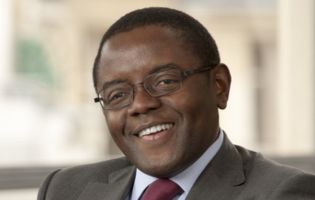 Clement Fondufe, a partner in Latham & Watkins’ London office and Co-Chair of the firm’s Africa practice, has been an active volunteer with ISLP’s government engagement program for 13 years. With ISLP, Clement focuses on contract negotiations for our global sovereign clients, with a goal of arriving at fairer and more sustainable arrangements that result in greater revenues and better social and environmental protections. Read more about Clement’s experience as an ISLP volunteer below:
Clement Fondufe, a partner in Latham & Watkins’ London office and Co-Chair of the firm’s Africa practice, has been an active volunteer with ISLP’s government engagement program for 13 years. With ISLP, Clement focuses on contract negotiations for our global sovereign clients, with a goal of arriving at fairer and more sustainable arrangements that result in greater revenues and better social and environmental protections. Read more about Clement’s experience as an ISLP volunteer below:
How did you get involved with ISLP?
My first experience with ISLP dates back to 2010, when I led a week-long workshop in Tanga, Tanzania, for the Government of Tanzania focusing on International Contract Management Practices, in collaboration with the United Nations Development Program.
What drew you to the volunteer opportunity?
Essentially, my commitment to volunteer work (mostly in Africa) stems from my profound conviction that one of the key hurdles to development in Africa is the lack of capacity on the continent, especially in the natural resources sector. The path to development is a delicate one that needs resolve, discipline and, above all, the capacity to oversee and achieve this goal. The
discovery of resources, their development and successful monetization, the management of the revenues derived therefrom, and their deployment in national development all require political vision and capacity. It is my aspiration that through my modest contribution, I can help to build this capacity where it is lacking or to strengthen it where it already exists.
What project(s) have you been involved in?
I have been involved in a variety of assignments for and on behalf of ISLP. Some of the major highlights include:
- I assisted the Government of Mauritania in the development and negotiation of a Global Convention Agreement for the implementation of several large-scale green hydrogen and ammonia export projects
- I assisted the Government of Sierra Leone, in collaboration with the African Legal Support Facility, in the development of: (i) a strategic roadmap for the implementation of seaport project, and (ii) a draft concession agreement
- I provided training to industry participants on conducting oil and gas transactions in Kenya, in association with the Strathmore Extractive Industry Centre at Strathmore University in Kenya
- For the Ghana Oil and Gas Inclusive Growth (GOGIG), I conducted an overall assessment of Ghana’s oil and gas legislation, along with a comparative study of such laws when benchmarked against other comparable African and regional jurisdictions
- I reviewed and edited an article on State Equity Participation in Mining Companies in Africa for the World Bank’s Africa Mining Legislation Atlas (AMLA)
Is there a particular moment during the volunteer experience that stood out to you or that you have taken away as particularly significant?
During one of my assignments, we were reviewing an international contract (name of country and international investor intentionally withheld) that was so one-sided and heavily skewed in favor of the international investor. Even though we managed to renegotiate a more balanced and equitable outcome for the country and our team was (rightfully) ecstatic with the result, I have, to this day, continued to ask myself how many of such lop-sided and unfair contracts are out there, and why the very leaders of countries that are supposed to be custodians of the national patrimony would sign these contracts.
What impact do you believe your ISLP experience has had? Why is ISLP’s work important?
I have come to have a deeper understanding of the predicament in which many African governments find themselves, as a direct result of the lack of the critical legal, technical and financial capabilities necessary to evaluate the many business opportunities that present themselves. Perhaps, to a certain extent also, I can now see why the ownership of vast resources that are replete in the continent has not necessarily led to shared wealth and economic and financial empowerment in those countries.
The asymmetry of knowledge between the governments of many African countries and the foreign investors making massive investments in these countries exposes them to many risks, the most important of which is that they end up with contractual terms and conditions for such investments that are sub-optimal. ISLP performs a critical role by providing competent legal professionals from pre-eminent international law firms to assist these countries to ensure that they obtain fair, balanced and equitable contract terms to underpin these investments. This in turn ensures that the contracts are generally consistent with international best practices and industry standards and, therefore, are less likely to be the subject matter of future disagreements.
Is there anything else you’d like to share with us?
I’d like to take this opportunity to express my sincere gratitude first to ISLP, and then to its corps of volunteers and its funders for the tremendous work they do. Doubtless, their role is critical and indispensable in getting ISLP to achieve its mission and goal.
